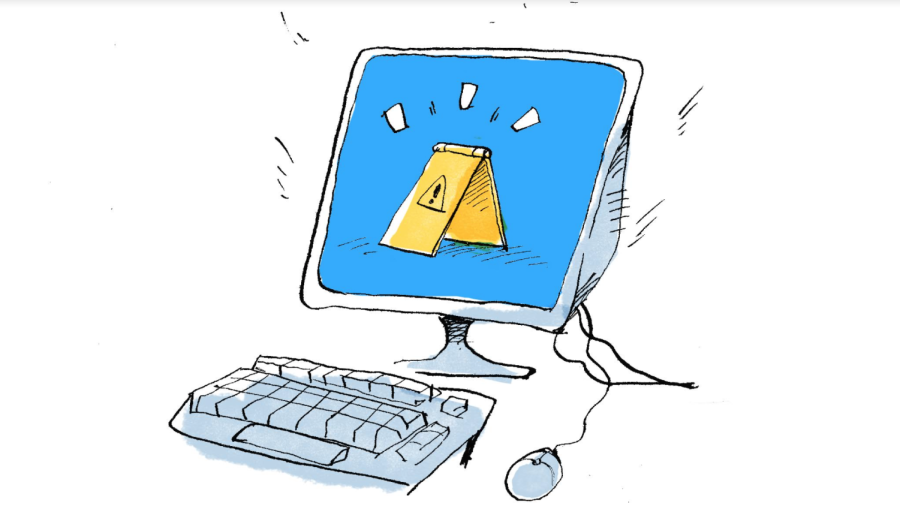The importance of internet safety
November 20, 2018
The internet has become a prominent part of everyday life to many people. Some don’t often think twice about who they interact with or what they post online.
Hannah Kelley, a junior at Kent State, interacted with someone she thought she could trust through Instagram. Kelley was befriended by David Gruden, a photographer who conducted seemingly normal photoshoots with Kent State students.
“I’d seen his social media account a few times before he followed me,” Kelley said. “I believe he followed me a few months before I’d met him. I saw that he had done photoshoots with my friend.”
Kelley’s prior knowledge of Gruden and his work with her friend, allowed her to begin to trust him. “He also seemed trustworthy to me because he had tasteful photographs of normal families and children on his Instagram account,” Kelley said. “He seemed like any credible amateur photographer.”
Kelley claims her experiences with Gruden were extremely normal. “He seemed like a normal, regular person,” Kelley said. “I think they always do. He wasn’t creepy and there were no red flags during my shoot with him.”
Their photoshoot together was very normal and brief.
“We met in a public place and it was exactly like my experience with every other photographer,” Kelley said. “We met at a carnival and he took photos of me and a friend in front of a ferris wheel. It was fun. I wasn’t a victim of anything.”
A few months after their encounter, on the morning of Oct. 30, law enforcement executed a federal search warrant at Gruden’s residence in Lisbon, Ohio. Gruden was federally charged with solicitation and advertising for child pornography. “The investigation will last an approximate 9 months,” said the Federal Bureau of Investigation Cleveland Division.
Upon hearing the news, Kelley says it was one of the most shocking things she had ever heard in her life.
“I couldn’t stop thinking about it,” Kelley said. “I couldn’t stop thinking about the kids and how you can’t trust anyone. It’s amazing how you really don’t know anyone.”
Kelley claims that this incident made her become a lot more careful.
“It’s made me realize that sometimes social media can make you feel like you know people but you never really do,” Kelley said.
“My biggest takeaway is that you can’t trust anyone, period,” Kelley said. “Social media can portray anyone to be anything. I wasn’t a victim but other people were and there was no way for me to know that. I learned to be more careful and to never take somebody’s word about someone else. Just because somebody else has worked with somebody, does not mean that that person is credible.”
Kent State Professor Kambiz Ghazinou, a data security and privacy specialist, spoke out about the importance of being smart and safe while using the internet.
Ghazinou stresses the importance of keeping your social media profiles private. “Most profiles you can create online are set to public, by default,” Ghazinou said. “Make sure you always change it to private. This will help protect your personal information.”
“If you happen to meet someone online, don’t necessarily believe what they have to say,” Ghazinou said. “ You cannot trust them because of who they say they are, it is extremely easy for someone to fabricate an online profile. If someone claims they work for a certain company, look into the company’s website or their LinkedIn account. Always double check the information they give you.”
Ghazinou stresses the importance of always meeting up with people in public places, especially if you had met them online.
Sometimes websites you encounter may be unsafe, as well.
“You can trust a website that you encounter online by looking for a lock icon by the URL,” Ghazinou explains. “This is called the second secure layer. This ‘layer’ keeps your information private and ensures it is going to be encrypted.”
“Be careful with emails that claim to be from your bank or local retail store,” Ghazinou said.
These emails can often be part of “phishing scams.” A phishing scam is a fraudulent attempt to obtain sensitive information such as usernames, passwords and credit card details by disguising as a trustworthy entity in an electronic communication.
“These emails want you to click on the link given and give your information,” Ghazinou said. “Don’t trust the credibility of the email by who they claim to be or by the logos given, always check to make sure the URL contains a lock icon.”
Ghazinou also explains, “people often post things on social media because they are unaware of the side effects. For example, high school students will post a picture of their license. Yes, it is exciting but at least mask your personal information. With your name, postal code, date of birth and gender, someone can apply for a credit card under your name. Many people are simply unaware what is sensitive information.”
“Location services is also something to look out for, when using social media or other apps,” Ghazinou said. “Most people think the apps require your location to always be on, which is untrue. Try to make sure your location services are off in apps, so you are unable to be tracked.”
“We are conducting a study that shows even fitness trackers, such as Fitbit’s, can find exactly what you’re up to,” Ghazinou said. “They are able to find what school your kids go to, what bank you go to and what grocery store you shop at, based on your traveling patterns. Location services encompasses much more than just finding the closest Starbucks.”
Olivia Boris is the safety reporter. Contact her at [email protected].

























